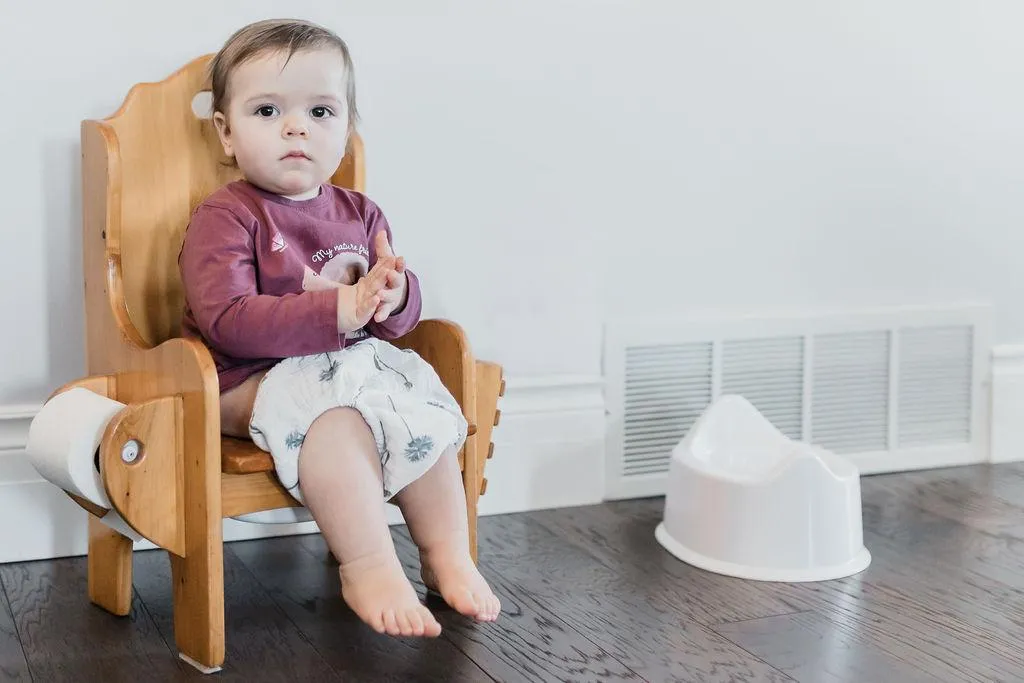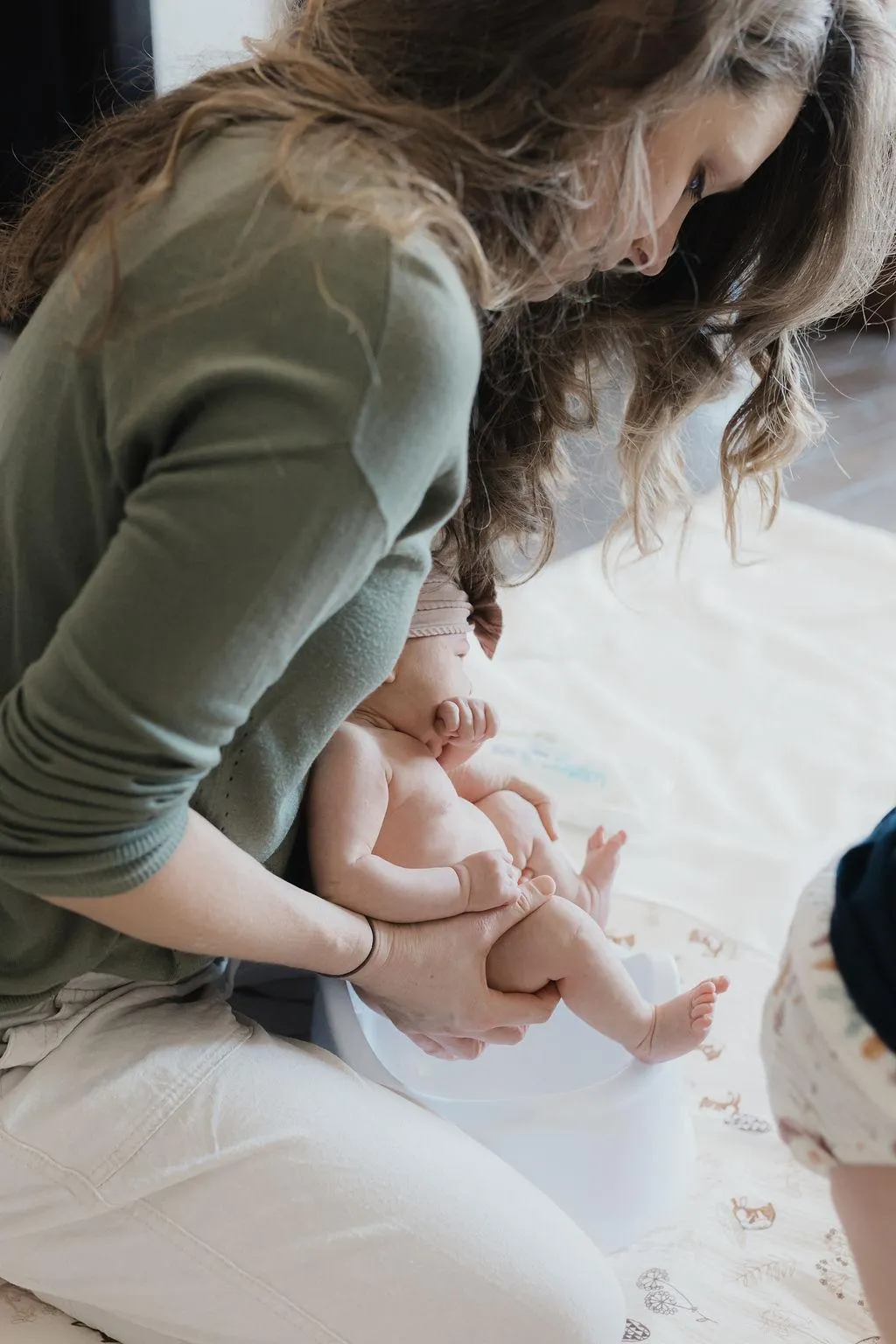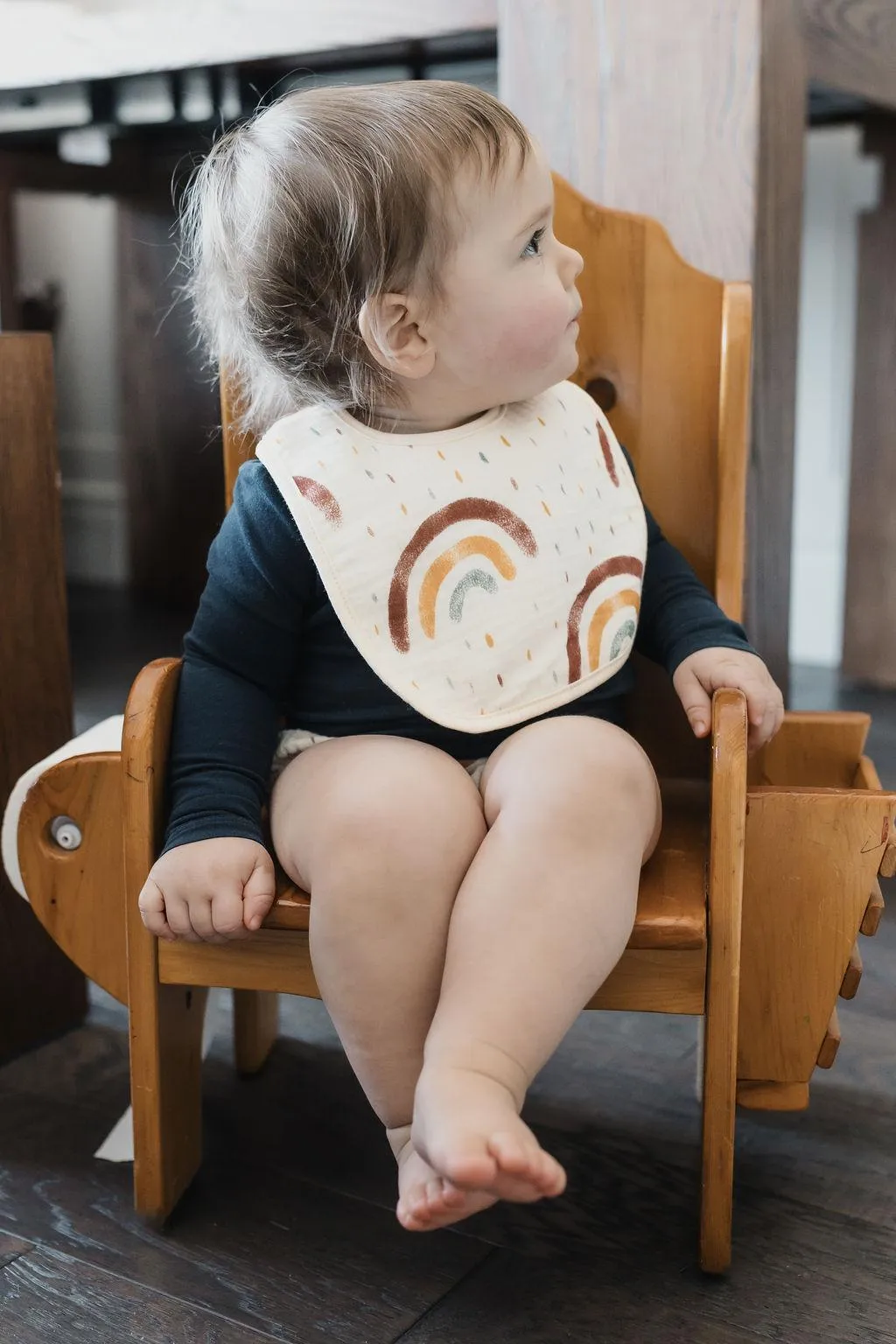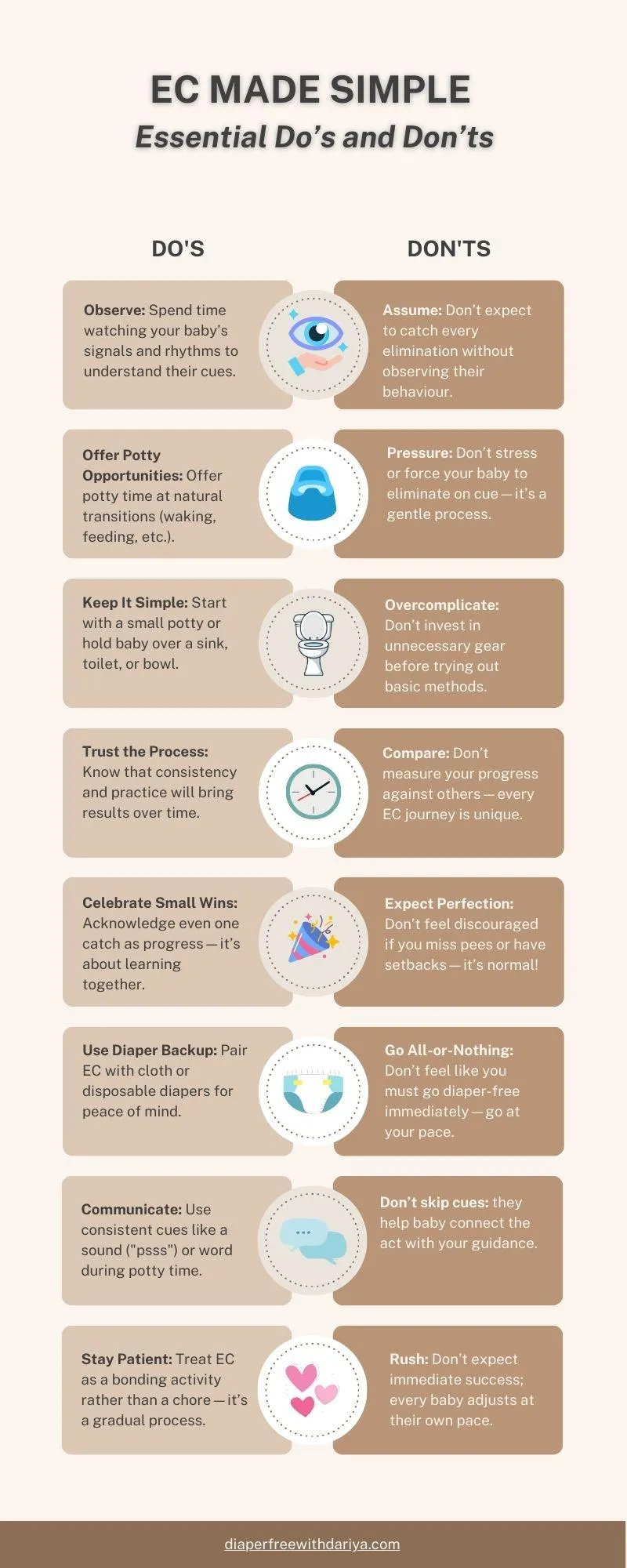ELIMINATION COMMUNICATION (aka EC)
EC is a gentle, natural way to help your baby learn to go potty without relying on diapers all the time. Instead of waiting for your baby to fill their diaper, EC involves paying attention to the signals your baby gives when they need to pee or poop and helping them use a potty or toilet.

Here’s how it works:
1. Recognizing the Cues: Just like babies give signs when they’re hungry or tired, they also have signals when they need to go. Some babies squirm, get fussy, or make certain facial expressions. Over time, you’ll learn to recognize these patterns.
2. Offering Opportunities: Throughout the day, you can offer your baby chances to use the potty. Common times are after waking up, after feeding, or before sleep. You can hold them over a small potty or the toilet. Even if they don’t go, it helps them get used to the routine.
3. Building a Rhythm: As you practice, you’ll start to notice when your baby usually needs to go. You’ll get better at offering the potty at the right times, and your baby will start to associate the feeling of needing to go with using the potty, rather than just going in a diaper.
4. Less Reliance on Diapers: EC doesn’t mean you have to get rid of diapers completely, especially at first. Many parents use them as a backup, especially at night or during outings. Over time, your baby will need fewer and fewer diapers as they get used to using the potty.
5. Communication: EC is all about tuning in to your baby and working together. It’s not about training or pushing them to be diaper-free, but instead, it’s about responding to their natural body signals and helping them stay clean and comfortable.
For new parents, it can feel a bit daunting, but it’s flexible! You can practice part-time or full-time, depending on what works for your family. EC can lead to fewer diaper changes, less diaper rash, and a closer connection with your baby. Plus, it can help make potty training easier (or never have to do it!) later on because they’re already familiar with the process!



Potty Training Before (1940s-1950s):
Average Age: By the 1940s-1950s, most children in Western cultures were potty trained by the age of 18 months. Many babies were trained before or soon after they started walking, often by 12-18 months.
Method: Parents used cloth diapers and closely monitored their babies' cues. Potty training was often started early, as the inconvenience of cloth diapers (washing and drying) encouraged parents to help their child become diaper-free as soon as possible.
Potty Training Today:
Average Age: According to more recent studies, the average potty training age in the United States and other developed countries has risen significantly. Most children are now potty trained between 2.5 and 3 years old (30-36 months). Some children may not be fully trained until closer to 3.5 years.
Method: Today’s parents tend to follow a more child-led approach, starting when they believe their child shows readiness. The convenience of disposable diapers, which are more absorbent and keep children feeling dry longer, has reduced the urgency for early potty training.
Skip the Diaper Drama—Start EC today for a Happier Baby!
The Best Time to Start EC Was Yesterday. The Second Best Time? Right Now!
Your baby is ready and so can you be.
Frequently Asked Questions
Isn't EC time-consuming?
Not at all! While it might seem like pottying a baby would add extra work, EC often saves you time in the long run. By catching pees and poops in the potty, you’ll reduce the number of diaper changes and avoid messy blowouts. Over time, you’ll become attuned to your baby’s natural cues, making the process seamless. And let’s not forget—washing fewer cloth diapers or spending less on disposables means less time spent on laundry or shopping trips.
How much money can I save with EC?
EC can save you hundreds to thousands of dollars. By catching more of your baby’s potty needs early, you’ll use fewer diapers (whether cloth or disposable). Families who practice EC part-time still see significant savings, while full-time EC practitioners often transition out of diapers completely by walking, 18 months or sooner—saving even more. Plus, fewer diaper rash creams and laundry detergents mean less spending overall.
Isn't EC hard to do?
Not at all! EC is about working with your baby’s natural instincts, not against them. Many parents find that once they start recognizing their baby’s cues, it becomes second nature.Babies naturally prefer to stay clean and dry, and fussiness is often a potty cue—even from birth! A happy, healthy baby who feels heard and understood is much easier to care for than one dealing with discomfort or frustration from dirty diapers.
How can I start EC without even buying a potty?
You don’t need fancy equipment to start EC. Many parents begin by holding their baby over a bowl, sink, or toilet to catch their first pee or poop.
I have a FREE 45 EC crash course, all the information you need to get started check it out here.
How does EC work at night?
Nighttime EC is simpler than you might think. Babies often pee shortly after waking, so you can offer the potty when they stir in the night or early in the morning. Some parents keep a potty by the bed or use a cloth diaper backup for peace of mind. Starting with one catch per night can build confidence without disrupting sleep too much. Believe it or not this can help you get MORE sleep - I teach all about this in my Complete Guide to EC course.
Can I do EC when I’m out of the house?
Absolutely! EC on the go is all about being prepared and flexible. Many parents carry a small, portable potty or use public restrooms. If you’re nervous, try part-time EC while out—catching what you can and using diapers as a backup. The key is to stay relaxed. Even one successful catch while out is a win, and with practice, it’ll feel just as natural as it does at home. I share all my secrets and tricks to make this easy in my Complete Guide to EC course.
How can I tell if my baby needs to use the potty?
Babies have natural cues that indicate they need to go. These might include squirming, grunting, sudden fussiness, or even looking at you expectantly. Over time, you’ll learn to recognize these signs and can offer the potty before they go. From birth, many babies dislike being wet or dirty, and responding to their cues builds trust, reduces frustration, and strengthens your bond. Learn all my secrets about cues in my Complete Guide to EC course!
Ready to Start? Here’s a Special Offer Just for You!
If you’ve read this far, you’re ready to take the first step toward EC success! To make it easier, I’m offering 50% off my Complete Guide to Elimination Communication using the code EC50OFF. This guide covers everything—from getting started at home, nighttime EC, EC while out, and transitioning out of diapers completely. Take advantage of this offer and start your EC journey today!
Less Disposables. More Love.
Contact Dariya:
Copyright© 2025 Dariya Koncz - All Rights Reserved.

Facebook
Instagram
Youtube